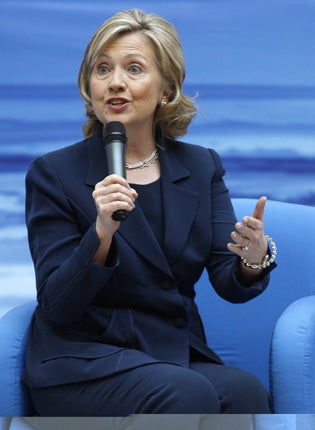Iran is becoming a military dictatorship, says Clinton

Hillary Clinton, the US Secretary of State, told an audience of university students in Qatar yesterday that she believes Iran is drifting towards becoming a military dictatorship because of the increasing influence of the élite Revolutionary Guard in the country's leadership and politics.
The remarks seemed aimed in part to set the stage for a new round of international sanctions on Iran in the dispute over its alleged nuclear ambitions. Those measures, if approved, are likely to target the Guard and its web of business activities.
"We see that the government of Iran is being supplanted and that Iran is moving toward a military dictatorship," Mrs Clinton remarked during a televised debate at a campus of Carnegie Mellon University in Doha, the capital of Qatar.
"We are planning to try to bring the world community together in applying pressure to Iran through sanctions adopted by the United Nations that will be aimed at those enterprises controlled by the Revolutionary Guard," she added.
Last week Tehran announced it was starting to upgrade its stockpile of 3.5 per cent enriched uranium to a 20 per cent level of enrichment. The move flew in the face of efforts by the West to finalise a deal, under which Iran would export low-enriched uranium and reimport it as fuel rods suitable for use only in a reactor producing medical isotopes.
Iran continues to insist that its nuclear activities are geared to civilian uses only. The West, however, remains deeply sceptical. "Iran has consistently failed to live up to its responsibilities," Mrs Clinton went on. "It has refused to demonstrate to the international community that its nuclear program is entirely peaceful."
The official in charge of the nuclear programme, Ali Akbar Salehi, said that, since last week's decision on upgrading the stockpile, Iran had received a fresh proposal for a settlement. "After Iran's decision to go for domestic production of 20 percent enriched uranium, a proposal was given to us by Russia, France and the United States, which we are reviewing," he was quoted as saying. No such new proposal exists, however, US officials insisted.
In the meantime, the Prime Minister of Israel, Benjamin Netanyahu, used a visit to Moscow to urge Russia to support "sanctions with teeth" in the UN Security Council. Israel has not hidden its alarm over Iran's nuclear activities and has publicly said it will not close the door on possible military action.
The real intentions of Iran remain murky, with many of its words and actions apparently aimed either at quelling political dissatisfaction at home or increasing its leverage in negotiations with the West.
Clinton said the Obama administration is trying to "send a message to Iran – a very clear message" that the US is still open to finding a diplomatic settlement. She added, however: "We will not stand idly by while you pursue a nuclear program that can be used to threaten your neighbours and even beyond".
Subscribe to Independent Premium to bookmark this article
Want to bookmark your favourite articles and stories to read or reference later? Start your Independent Premium subscription today.

Join our commenting forum
Join thought-provoking conversations, follow other Independent readers and see their replies